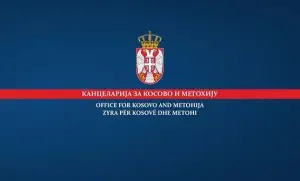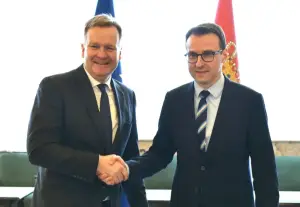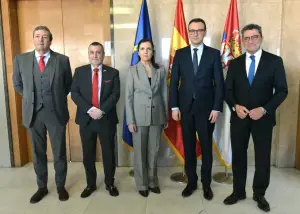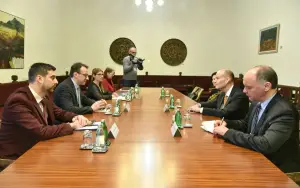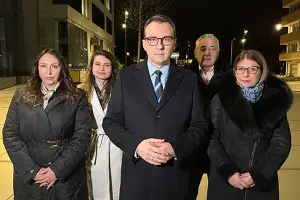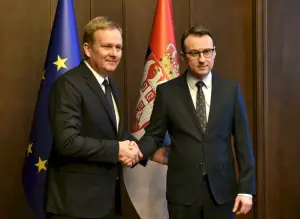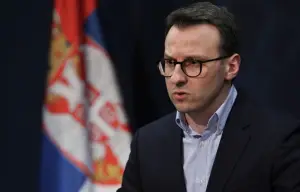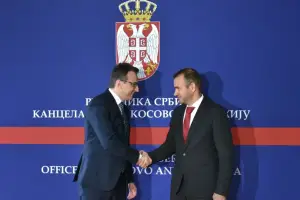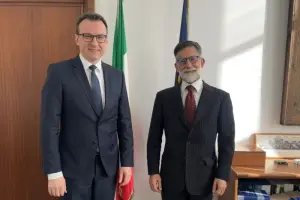Q:
A:
Covic sends letter to Security Council, Annan
Belgrade,
5 August 2004
Coordinating Centre for Kosovo-Metohija President Nebojsa Covic has sent a letter to United Nations Secretary-General Kofi Annan and the UN Security Council, explaining why local Serbs should not take part in the forthcoming Kosovo election.
According to Covic, “Belgrade is pressed to take a high road and encourage the Serbs in Kosovo and Metohija to participate in the elections, even though UNMIK has unilaterally reduced Belgrade’s role to merely being informed.”
LETTER TO H.E. MR. KOFI ANNAN
UN Secretary General
UNITED NATIONS
H.E. Mr. Kofi Annan
Secretary General
New York
Belgrade 05. August 2004. Your Excellency,
It has been more than five years since UN and NATO entered Kosovo and Metohia. In June 1999, Kosovo Albanians greeted them hopeful that the international troops would make their dreams come true, that the independence was the matter of days. Their Serbian neighbors hoped that the international presence would bring the standards of the Western democracies the troops came from to the Province and that their lives, their property, and their human dignity would be protected. It has been more than five years and the hope is gone. Kosovo and Metohia of today is, in many ways, in worse situation than Kosovo and Metohia of June 1999.
The Albanian leadership is increasingly growing impatient and frustrated with what they see as “an unnecessary delay” in the course of things. To this end, they have seen the March violence accelerating their political agenda with what they view as the semi-promise of a few from international community to go for independence in 2005, regardless of the negative impact it had on their image abroad. The Serbs and other non-Albanians, on the other hand, are increasingly feeling insecure and desperate, since the events of March 2004 have shown that the whole democratic world could not or would not protect them.
Every discussion about Kosovo and Metohia today has to start with the effects of the March events. There are no doubts that the March violence was organized and clearly aimed at driving Serbs and other non-Albanians out of the Province. Over 60,000 individuals who took part in riots targeted their homes, churches, and monasteries with surgical precision. Close to four thousand and five hundred people were expelled from their hearths, over seven hundred homes were torched, and thirty-five medieval churches and monasteries were either destroyed or severely damaged. And they had all been under the protection of KFOR. Yet, not a single principal organizer has been publicly identified and brought to justice. A large number of minor offenders have been arrested, a few of them have been prosecuted, but none of those who pulled the strings and who are responsible for instigating the coordinated large-scale violence against Serbs and other non-Albanians have been identified and pressed charges against.
The March pogrom is a consequence of defunct and disoriented actions of the international administration in Kosovo and Metohia. Unlike the energetic and firm approach the international community has taken elsewhere in the region, and in Bosnia and Herzegovina in particular, UNMIK seems to be afraid of its own shadow. And more than anything, it seems to be afraid of the Albanian reaction to any decision that needs to be made. As a consequence, there have been no energetic actions against Kosovo Albanian officials blocking returns. As a consequence, there has been no coherent response to the Kosovo and Metohia Assembly issuing decisions clearly outside its jurisdiction. As a consequence, not a single perpetrator of hideous crimes committed against Serbs has been identified and brought to justice. As a consequence, March 17 happened.
We can all recall the time when the UN assumed control over the Province under the mandate that has been clearly defined by UNSC Resolution 1244. After the initial euphoria, it has become clear, despite few successes, that the mission has failed in meeting its main objective. Returns have gone virtually nowhere, and the provisional institutions of self-government have become perceived as discriminatory, dysfunctional, ineffective and corrupt. The politics of the Albanian leadership has been reduced to ritual demands for independence, as if the independence would solve the catastrophic human rights situation and profound economic crisis. Instead of building a truly multiethnic, democratic, and prosperous modern society that would serve as a model for the region, the passivity and fear of those who have been sent to the Province to help it be built have allowed that an infrastructure be prepared for an independent state.
I would like to believe that the new SRSG will have the stamina and time to change this situation. He will have to start his mandate with a difficult job of securing Serb participation in the coming elections. In the short time that he has available for this job, it will be hard, if not impossible, to restore confidence of Kosovo and Metohia Serbs. That confidence has been gradually lost over two and a half years, ever since his two predecessors chose to disregard the Common Document and the commitments made on behalf of the international administration in numerous agreements signed with Belgrade.
The time is running fast. Once again, Belgrade is pressed to take a high road and encourage the Serbs in Kosovo and Metohia to participate in the elections, even though UNMIK has unilaterally reduced Belgrade’s role to merely being informed. Nevertheless, we would still like to be able to contribute to the democratic processes in the Province as constructively as possible. With that in mind, we have made a number of comments and proposals in the recent process of drafting Kosovo and Metohia key documents. All these comments and proposals have been blatantly ignored, which has left us with no arguments to bring Kosovo and Metohia Serbs about to cast their ballots.
We want to be able to help. But, in order to do so, we need to be helped, too, by immediate energetic steps taken by the international community and the new Special Representative. We need a new tone of sobriety, determination, and fearlessness in setting the priorities and dealing with those who obstruct the process of their implementation, including readiness to remove officials who block these processes and do not promote interethnic tolerance.
To this end, enhanced security, freedom of movement, and returns of Serbs and other non-Albanians in Kosovo and Metohia must be on the very top of the new SRSG’s agenda. Results on these issues have been long overdue and we need them now. A thorough decentralization of power, which would adequately address security and other concerns of Serbs and other non-Albanians in Kosovo and Metohia, and which would include redrawing of municipal boundaries, would be a step in the right direction, but only with solid minority rights that are accepted and observed by all communities.
Despite repeated attempts of the Kosovo Albanian leadership and a few representatives of the international community to justify the absence of any results in these issues by unresolved final status of the Province, the March violence has shown that it will not be possible to have Kosovo and Metohia that is both genuinely multiethnic and independent. Any attempt to have this “quick and clean” solution that is advocated by Kosovo and Metohia Albanians and their influential friends abroad, and, regrettably, silently implemented on the ground, will lead to a mono-ethnic state in the heart of the Balkans.
If the task of putting the ongoing creation of an independent mono-ethnic Kosovo and Metohia to a halt is too overwhelming for the international community and the new SRSG, there will be no Serb voters at the polling stations this fall. And, in a year or two, there will be no Serbs left in the Province at all. Putting pressure on one side only to make concessions might be convenient, but it will yield only short-term results. If the world is unable to have the same approach in enforcing standards that has been used elsewhere in the region, we need to search for other solutions and we need to do it now. Unanimously, energetically, and persistently. Tomorrow will be too late.
Please, accept, Excellency, the assurances of my highest consideration.
PRESIDENT
Nebojša Čović, Ph. D
Belgrade 05. August 2004. Your Excellency,
It has been more than five years since UN and NATO entered Kosovo and Metohia. In June 1999, Kosovo Albanians greeted them hopeful that the international troops would make their dreams come true, that the independence was the matter of days. Their Serbian neighbors hoped that the international presence would bring the standards of the Western democracies the troops came from to the Province and that their lives, their property, and their human dignity would be protected. It has been more than five years and the hope is gone. Kosovo and Metohia of today is, in many ways, in worse situation than Kosovo and Metohia of June 1999.
The Albanian leadership is increasingly growing impatient and frustrated with what they see as “an unnecessary delay” in the course of things. To this end, they have seen the March violence accelerating their political agenda with what they view as the semi-promise of a few from international community to go for independence in 2005, regardless of the negative impact it had on their image abroad. The Serbs and other non-Albanians, on the other hand, are increasingly feeling insecure and desperate, since the events of March 2004 have shown that the whole democratic world could not or would not protect them.
Every discussion about Kosovo and Metohia today has to start with the effects of the March events. There are no doubts that the March violence was organized and clearly aimed at driving Serbs and other non-Albanians out of the Province. Over 60,000 individuals who took part in riots targeted their homes, churches, and monasteries with surgical precision. Close to four thousand and five hundred people were expelled from their hearths, over seven hundred homes were torched, and thirty-five medieval churches and monasteries were either destroyed or severely damaged. And they had all been under the protection of KFOR. Yet, not a single principal organizer has been publicly identified and brought to justice. A large number of minor offenders have been arrested, a few of them have been prosecuted, but none of those who pulled the strings and who are responsible for instigating the coordinated large-scale violence against Serbs and other non-Albanians have been identified and pressed charges against.
The March pogrom is a consequence of defunct and disoriented actions of the international administration in Kosovo and Metohia. Unlike the energetic and firm approach the international community has taken elsewhere in the region, and in Bosnia and Herzegovina in particular, UNMIK seems to be afraid of its own shadow. And more than anything, it seems to be afraid of the Albanian reaction to any decision that needs to be made. As a consequence, there have been no energetic actions against Kosovo Albanian officials blocking returns. As a consequence, there has been no coherent response to the Kosovo and Metohia Assembly issuing decisions clearly outside its jurisdiction. As a consequence, not a single perpetrator of hideous crimes committed against Serbs has been identified and brought to justice. As a consequence, March 17 happened.
We can all recall the time when the UN assumed control over the Province under the mandate that has been clearly defined by UNSC Resolution 1244. After the initial euphoria, it has become clear, despite few successes, that the mission has failed in meeting its main objective. Returns have gone virtually nowhere, and the provisional institutions of self-government have become perceived as discriminatory, dysfunctional, ineffective and corrupt. The politics of the Albanian leadership has been reduced to ritual demands for independence, as if the independence would solve the catastrophic human rights situation and profound economic crisis. Instead of building a truly multiethnic, democratic, and prosperous modern society that would serve as a model for the region, the passivity and fear of those who have been sent to the Province to help it be built have allowed that an infrastructure be prepared for an independent state.
I would like to believe that the new SRSG will have the stamina and time to change this situation. He will have to start his mandate with a difficult job of securing Serb participation in the coming elections. In the short time that he has available for this job, it will be hard, if not impossible, to restore confidence of Kosovo and Metohia Serbs. That confidence has been gradually lost over two and a half years, ever since his two predecessors chose to disregard the Common Document and the commitments made on behalf of the international administration in numerous agreements signed with Belgrade.
The time is running fast. Once again, Belgrade is pressed to take a high road and encourage the Serbs in Kosovo and Metohia to participate in the elections, even though UNMIK has unilaterally reduced Belgrade’s role to merely being informed. Nevertheless, we would still like to be able to contribute to the democratic processes in the Province as constructively as possible. With that in mind, we have made a number of comments and proposals in the recent process of drafting Kosovo and Metohia key documents. All these comments and proposals have been blatantly ignored, which has left us with no arguments to bring Kosovo and Metohia Serbs about to cast their ballots.
We want to be able to help. But, in order to do so, we need to be helped, too, by immediate energetic steps taken by the international community and the new Special Representative. We need a new tone of sobriety, determination, and fearlessness in setting the priorities and dealing with those who obstruct the process of their implementation, including readiness to remove officials who block these processes and do not promote interethnic tolerance.
To this end, enhanced security, freedom of movement, and returns of Serbs and other non-Albanians in Kosovo and Metohia must be on the very top of the new SRSG’s agenda. Results on these issues have been long overdue and we need them now. A thorough decentralization of power, which would adequately address security and other concerns of Serbs and other non-Albanians in Kosovo and Metohia, and which would include redrawing of municipal boundaries, would be a step in the right direction, but only with solid minority rights that are accepted and observed by all communities.
Despite repeated attempts of the Kosovo Albanian leadership and a few representatives of the international community to justify the absence of any results in these issues by unresolved final status of the Province, the March violence has shown that it will not be possible to have Kosovo and Metohia that is both genuinely multiethnic and independent. Any attempt to have this “quick and clean” solution that is advocated by Kosovo and Metohia Albanians and their influential friends abroad, and, regrettably, silently implemented on the ground, will lead to a mono-ethnic state in the heart of the Balkans.
If the task of putting the ongoing creation of an independent mono-ethnic Kosovo and Metohia to a halt is too overwhelming for the international community and the new SRSG, there will be no Serb voters at the polling stations this fall. And, in a year or two, there will be no Serbs left in the Province at all. Putting pressure on one side only to make concessions might be convenient, but it will yield only short-term results. If the world is unable to have the same approach in enforcing standards that has been used elsewhere in the region, we need to search for other solutions and we need to do it now. Unanimously, energetically, and persistently. Tomorrow will be too late.
Please, accept, Excellency, the assurances of my highest consideration.
PRESIDENT
Nebojša Čović, Ph. D
UNITED NATIONS
H.E. Mr. Andrey I.Denisov
President of the Security Council of the United Nations
New York
Belgrade 05. August 2004.
Your Excellency,
It has been more than five years since UN and NATO entered Kosovo and Metohia. In June 1999, Kosovo Albanians greeted them hopeful that the international troops would make their dreams come true, that the independence was the matter of days. Their Serbian neighbors hoped that the international presence would bring the standards of the Western democracies the troops came from to the Province and that their lives, their property, and their human dignity would be protected. It has been more than five years and the hope is gone. Kosovo and Metohia of today is, in many ways, in worse situation than Kosovo and Metohia of June 1999.
The Albanian leadership is increasingly growing impatient and frustrated with what they see as “an unnecessary delay” in the course of things. To this end, they have seen the March violence accelerating their political agenda with what they view as the semi-promise of a few from international community to go for independence in 2005, regardless of the negative impact it had on their image abroad. The Serbs and other non-Albanians, on the other hand, are increasingly feeling insecure and desperate, since the events of March 2004 have shown that the whole democratic world could not or would not protect them.
Every discussion about Kosovo and Metohia today has to start with the effects of the March events. There are no doubts that the March violence was organized and clearly aimed at driving Serbs and other non-Albanians out of the Province. Over 60,000 individuals who took part in riots targeted their homes, churches, and monasteries with surgical precision. Close to four thousand and five hundred people were expelled from their hearths, over seven hundred homes were torched, and thirty-five medieval churches and monasteries were either destroyed or severely damaged. And they had all been under the protection of KFOR. Yet, not a single principal organizer has been publicly identified and brought to justice. A large number of minor offenders have been arrested, a few of them have been prosecuted, but none of those who pulled the strings and who are responsible for instigating the coordinated large-scale violence against Serbs and other non-Albanians have been identified and pressed charges against.
The March pogrom is a consequence of defunct and disoriented actions of the international administration in Kosovo and Metohia. Unlike the energetic and firm approach the international community has taken elsewhere in the region, and in Bosnia and Herzegovina in particular, UNMIK seems to be afraid of its own shadow. And more than anything, it seems to be afraid of the Albanian reaction to any decision that needs to be made. As a consequence, there have been no energetic actions against Kosovo Albanian officials blocking returns. As a consequence, there has been no coherent response to the Kosovo and Metohia Assembly issuing decisions clearly outside its jurisdiction. As a consequence, not a single perpetrator of hideous crimes committed against Serbs has been identified and brought to justice. As a consequence, March 17 happened.
We can all recall the time when the UN assumed control over the Province under the mandate that has been clearly defined by UNSC Resolution 1244. After the initial euphoria, it has become clear, despite few successes, that the mission has failed in meeting its main objective. Returns have gone virtually nowhere, and the provisional institutions of self-government have become perceived as discriminatory, dysfunctional, ineffective and corrupt. The politics of the Albanian leadership has been reduced to ritual demands for independence, as if the independence would solve the catastrophic human rights situation and profound economic crisis. Instead of building a truly multiethnic, democratic, and prosperous modern society that would serve as a model for the region, the passivity and fear of those who have been sent to the Province to help it be built have allowed that an infrastructure be prepared for an independent state.
I would like to believe that the new SRSG will have the stamina and time to change this situation. He will have to start his mandate with a difficult job of securing Serb participation in the coming elections. In the short time that he has available for this job, it will be hard, if not impossible, to restore confidence of Kosovo and Metohia Serbs. That confidence has been gradually lost over two and a half years, ever since his two predecessors chose to disregard the Common Document and the commitments made on behalf of the international administration in numerous agreements signed with Belgrade.
The time is running fast. Once again, Belgrade is pressed to take a high road and encourage the Serbs in Kosovo and Metohia to participate in the elections, even though UNMIK has unilaterally reduced Belgrade’s role to merely being informed. Nevertheless, we would still like to be able to contribute to the democratic processes in the Province as constructively as possible. With that in mind, we have made a number of comments and proposals in the recent process of drafting Kosovo and Metohia key documents. All these comments and proposals have been blatantly ignored, which has left us with no arguments to bring Kosovo and Metohia Serbs about to cast their ballots.
We want to be able to help. But, in order to do so, we need to be helped, too, by immediate energetic steps taken by the international community and the new Special Representative. We need a new tone of sobriety, determination, and fearlessness in setting the priorities and dealing with those who obstruct the process of their implementation, including readiness to remove officials who block these processes and do not promote interethnic tolerance.
To this end, enhanced security, freedom of movement, and returns of Serbs and other non-Albanians in Kosovo and Metohia must be on the very top of the new SRSG’s agenda. Results on these issues have been long overdue and we need them now. A thorough decentralization of power, which would adequately address security and other concerns of Serbs and other non-Albanians in Kosovo and Metohia, and which would include redrawing of municipal boundaries, would be a step in the right direction, but only with solid minority rights that are accepted and observed by all communities.
Despite repeated attempts of the Kosovo Albanian leadership and a few representatives of the international community to justify the absence of any results in these issues by unresolved final status of the Province, the March violence has shown that it will not be possible to have Kosovo and Metohia that is both genuinely multiethnic and independent. Any attempt to have this “quick and clean” solution that is advocated by Kosovo and Metohia Albanians and their influential friends abroad, and, regrettably, silently implemented on the ground, will lead to a mono-ethnic state in the heart of the Balkans.
If the task of putting the ongoing creation of an independent mono-ethnic Kosovo and Metohia to a halt is too overwhelming for the international community and the new SRSG, there will be no Serb voters at the polling stations this fall. And, in a year or two, there will be no Serbs left in the Province at all. Putting pressure on one side only to make concessions might be convenient, but it will yield only short-term results. If the world is unable to have the same approach in enforcing standards that has been used elsewhere in the region, we need to search for other solutions and we need to do it now. Unanimously, energetically, and persistently. Tomorrow will be too late.
Please, accept, Excellency, the assurances of my highest consideration.
PRESIDENT
Nebojša Čović, Ph. D
It has been more than five years since UN and NATO entered Kosovo and Metohia. In June 1999, Kosovo Albanians greeted them hopeful that the international troops would make their dreams come true, that the independence was the matter of days. Their Serbian neighbors hoped that the international presence would bring the standards of the Western democracies the troops came from to the Province and that their lives, their property, and their human dignity would be protected. It has been more than five years and the hope is gone. Kosovo and Metohia of today is, in many ways, in worse situation than Kosovo and Metohia of June 1999.
The Albanian leadership is increasingly growing impatient and frustrated with what they see as “an unnecessary delay” in the course of things. To this end, they have seen the March violence accelerating their political agenda with what they view as the semi-promise of a few from international community to go for independence in 2005, regardless of the negative impact it had on their image abroad. The Serbs and other non-Albanians, on the other hand, are increasingly feeling insecure and desperate, since the events of March 2004 have shown that the whole democratic world could not or would not protect them.
Every discussion about Kosovo and Metohia today has to start with the effects of the March events. There are no doubts that the March violence was organized and clearly aimed at driving Serbs and other non-Albanians out of the Province. Over 60,000 individuals who took part in riots targeted their homes, churches, and monasteries with surgical precision. Close to four thousand and five hundred people were expelled from their hearths, over seven hundred homes were torched, and thirty-five medieval churches and monasteries were either destroyed or severely damaged. And they had all been under the protection of KFOR. Yet, not a single principal organizer has been publicly identified and brought to justice. A large number of minor offenders have been arrested, a few of them have been prosecuted, but none of those who pulled the strings and who are responsible for instigating the coordinated large-scale violence against Serbs and other non-Albanians have been identified and pressed charges against.
The March pogrom is a consequence of defunct and disoriented actions of the international administration in Kosovo and Metohia. Unlike the energetic and firm approach the international community has taken elsewhere in the region, and in Bosnia and Herzegovina in particular, UNMIK seems to be afraid of its own shadow. And more than anything, it seems to be afraid of the Albanian reaction to any decision that needs to be made. As a consequence, there have been no energetic actions against Kosovo Albanian officials blocking returns. As a consequence, there has been no coherent response to the Kosovo and Metohia Assembly issuing decisions clearly outside its jurisdiction. As a consequence, not a single perpetrator of hideous crimes committed against Serbs has been identified and brought to justice. As a consequence, March 17 happened.
We can all recall the time when the UN assumed control over the Province under the mandate that has been clearly defined by UNSC Resolution 1244. After the initial euphoria, it has become clear, despite few successes, that the mission has failed in meeting its main objective. Returns have gone virtually nowhere, and the provisional institutions of self-government have become perceived as discriminatory, dysfunctional, ineffective and corrupt. The politics of the Albanian leadership has been reduced to ritual demands for independence, as if the independence would solve the catastrophic human rights situation and profound economic crisis. Instead of building a truly multiethnic, democratic, and prosperous modern society that would serve as a model for the region, the passivity and fear of those who have been sent to the Province to help it be built have allowed that an infrastructure be prepared for an independent state.
I would like to believe that the new SRSG will have the stamina and time to change this situation. He will have to start his mandate with a difficult job of securing Serb participation in the coming elections. In the short time that he has available for this job, it will be hard, if not impossible, to restore confidence of Kosovo and Metohia Serbs. That confidence has been gradually lost over two and a half years, ever since his two predecessors chose to disregard the Common Document and the commitments made on behalf of the international administration in numerous agreements signed with Belgrade.
The time is running fast. Once again, Belgrade is pressed to take a high road and encourage the Serbs in Kosovo and Metohia to participate in the elections, even though UNMIK has unilaterally reduced Belgrade’s role to merely being informed. Nevertheless, we would still like to be able to contribute to the democratic processes in the Province as constructively as possible. With that in mind, we have made a number of comments and proposals in the recent process of drafting Kosovo and Metohia key documents. All these comments and proposals have been blatantly ignored, which has left us with no arguments to bring Kosovo and Metohia Serbs about to cast their ballots.
We want to be able to help. But, in order to do so, we need to be helped, too, by immediate energetic steps taken by the international community and the new Special Representative. We need a new tone of sobriety, determination, and fearlessness in setting the priorities and dealing with those who obstruct the process of their implementation, including readiness to remove officials who block these processes and do not promote interethnic tolerance.
To this end, enhanced security, freedom of movement, and returns of Serbs and other non-Albanians in Kosovo and Metohia must be on the very top of the new SRSG’s agenda. Results on these issues have been long overdue and we need them now. A thorough decentralization of power, which would adequately address security and other concerns of Serbs and other non-Albanians in Kosovo and Metohia, and which would include redrawing of municipal boundaries, would be a step in the right direction, but only with solid minority rights that are accepted and observed by all communities.
Despite repeated attempts of the Kosovo Albanian leadership and a few representatives of the international community to justify the absence of any results in these issues by unresolved final status of the Province, the March violence has shown that it will not be possible to have Kosovo and Metohia that is both genuinely multiethnic and independent. Any attempt to have this “quick and clean” solution that is advocated by Kosovo and Metohia Albanians and their influential friends abroad, and, regrettably, silently implemented on the ground, will lead to a mono-ethnic state in the heart of the Balkans.
If the task of putting the ongoing creation of an independent mono-ethnic Kosovo and Metohia to a halt is too overwhelming for the international community and the new SRSG, there will be no Serb voters at the polling stations this fall. And, in a year or two, there will be no Serbs left in the Province at all. Putting pressure on one side only to make concessions might be convenient, but it will yield only short-term results. If the world is unable to have the same approach in enforcing standards that has been used elsewhere in the region, we need to search for other solutions and we need to do it now. Unanimously, energetically, and persistently. Tomorrow will be too late.
Please, accept, Excellency, the assurances of my highest consideration.
PRESIDENT
Nebojša Čović, Ph. D

